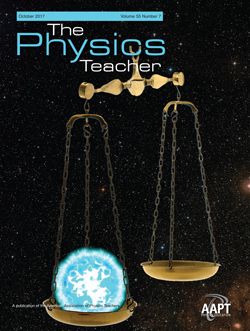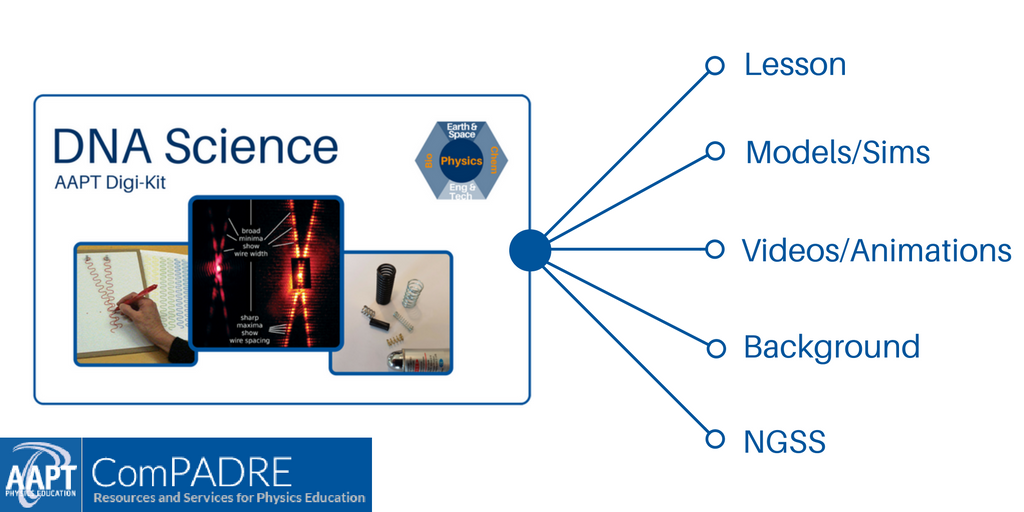Volume 55 Issue 7, October 2017
The Physics Teacher
This month's cover depicts a particle of mass, tipping the scale, a baryon, with its internal maelstrom of quarks and gluons portrayed as a dynamic blue-white froth. Don Lincoln’s fascinating article, “How things get heavy: The nature of mass,” details the surprising balance among rest mass energy, kinetic energy, and potential energy that makes up the bulk of ordinary matter. (cover art by Don Lincoln)
Letters to the Editor
The abaxial direction by Duane H. Pontius Jr. DOI: 10.1119/1.5003730
Clearing up eclipse misconceptions by Rondo N. Jeffery. DOI: 10.1119/1.5003732
Authors’ reply by Timothy Slater, and Richard Gelderman. DOI: 10.1119/1.5003733
AAPT Member Spotlight
Moses Rifkin. DOI: 10.1119/1.5003734
Columns
And the Survey Says..., Figuring Physics, iPhysicsLabs, Little Gems, Technology in the Classroom, Astronotes, Physics Challenge for Teachers and Students, Fermi Questions, Talkin' Physics, Visual Physics, and Websights.
Papers
Unveiling Privilege to Broaden Participation by Rachel E. Scherr, and Amy D. Robertson. DOI: 10.1119/1.5003737
Making Visual Illustrations of Physics Accessible to Blind Students by Josiane Pereira Torres, and Enicéia Gonçalves Mendes. DOI: 10.1119/1.5003738
How Things Get Heavy: The Nature of Mass by Don Lincoln. DOI: 10.1119/1.5003739
Use of Linear and Circular Polarization: The Secret LCD Screen and 3D Cinema by Stefan Richtberg, and Raimund Girwidz. DOI: 10.1119/1.5003740
Vocabulary and Experiences to Develop a Center of Mass Model by Taylor Kaar, Linda B. Pollack, Michael E. Lerner, and Robert J. Engels. DOI: 10.1119/1.5003741
Gaining Perspective on Paintings and Photographs: A Study in the Optics of Seeing by Bradley W. Carroll. DOI: 10.1119/1.5003742
Research Projects in Physics: A Mechanism for Teaching Ill-Structured Problem Solving by Jeff Milbourne, and Jonathan Bennett. DOI: 10.1119/1.5003743
One Method for Inhibiting the Copying of Online Homework by Hauke Busch. DOI: 10.1119/1.5003744
Direct Visualization of Mechanical Beats by Means of an Oscillating Smartphone by Marcos H. Giménez, Isabel Salinas, Juan A. Monsoriu, and Juan C. Castro-Palacio. DOI: 10.1119/1.5003745
A Moiré Pattern-Based Thread Counter by Gary Reich DOI: 10.1119/1.5003746
Stable and Unstable Rotational Dynamics of a Smartphone by Matthew Loth, Chad Gibbons, Sami Belaiter, and James B. Clarage DOI: 10.1119/1.5003747
Additional Resources
Race and Physics Teaching Collection Resource
DNA Science Lesson & Digi-Kit
Inspired by an article from The Physics Teacher, this multidisciplinary lesson and digital resource collection is based on How Rosalind Franklin Discovered the Helical Structure of DNA: Experiments in Diffraction (Braun, Tierney, & Schmitzer, 2011). Click the image to access this resource.
Article Collections from TPT and AJP
TPT Presents: Columns and other Collections from The Physics Teacher



